Students and staff let the cat out of the bag on one of the most specialist courses in further education ̶ animal care in land-based colleges
“Animals don’t care about lockdown, you know? They still need feeding, cleaning out, mucking out, looking after. That pressure hasn’t changed. We’re just glad the students can still come along to help us out.” Helen Martin, land-based curriculum manager at Bishop Burton College in east Yorkshire, is one of the lucky ones. Her specialist site, to which learners travel miles and miles from across the north, is so remote it has space for 100 resident students. All bored of remote learning, they regularly emerge from their rooms in masks and protective equipment when emailed to help with livestock on site.
But for most colleges delivering “land-based courses” – a term used to describe a whole array of qualifications in animal care, animal management and agriculture – the challenges of the pandemic have been unique even for the further education sector. And most staff have had to fend for themselves.
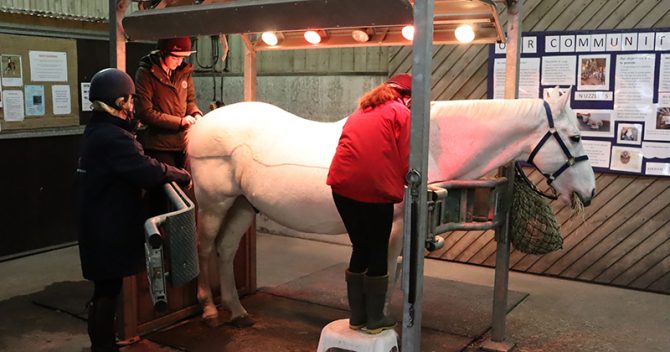
Take Herefordshire, Ludlow and North Shropshire College. Animal care unit manager Rebecca Walker oversees no fewer than 400 animals, covering 74 species, each one with its own enclosure requirements, feeding timetables, clean-out regimes and “enrichment” activities (which, as far as I can tell, means fun).
I ask for a quick list of the animals on site, and a David Attenborough programme wouldn’t cover it: boa constrictors, corn snakes, iguanas, crested geckos, tortoises, tarantulas, millipedes, cockroaches, turtles, toads, frogs, owls, buzzards, falcons, alpacas, goats, sheep, cockatoos, canaries, rheas (like ostriches, apparently), hamsters, chinchillas and gerbils. “And sadly our hedgehog passed away, so we’ll be getting a new hedgehog soon,” says Walker. “Oh, and monkeys.”
It must be one of the most high-stakes logistics FE tasks around. “We were seeing animals in other places around us being rehomed or euthanised, because they weren’t open to the public so no tickets were being sold,” frowns Walker. Ferrets have had to be particularly well-protected, she tells me, because, just like the mink culled in their thousands at farms across Denmark, they are susceptible to coronavirus.
We were seeing animals in other places around us being rehomed or euthanised
Death is not good for business; land-based colleges are often not just places of learning but tend to have commercial operations running on site as well. So it was all the more worrying that just as income was dropping off, food became very difficult to get hold of too. “We were trying to get our food and they were saying they couldn’t get it in, which was not good. The specialist and exotic food was especially difficult.” When the food finally came back on the market, the college bulk-bought just to make sure animals had enough to get through the winter.
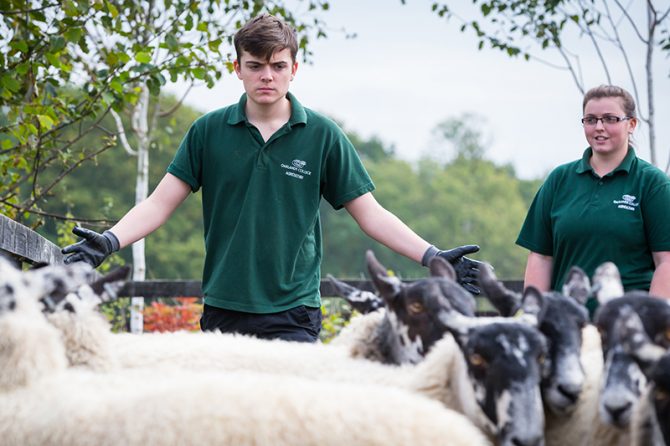
Usually, Walker and course leaders like her would have tens of learners on hand to help her team out amid such challenges. But unless there are residential placements, all these students have had to return home. “We’ve gone from having 120 students in a week helping us look after the animals to literally a team of just four of us. It’s been hard.”
The staff worked through the entire summer without a break, she tells me. “When there’s only a handful of you, to make sure the animals are safe, you just can’t take the time off. I feel so grateful to the staff, their commitment has been unbelievable.”
Charlotte Pugh, a former student now employed as an animal technician at the college, said when students were allowed back in between lockdowns they tackled the animal feed shortage by planting many fruit and vegetable seeds in the college’s huge greenhouse on site. “I think the hardest thing has been not having the students. We didn’t realise how much we relied on them and how much freedom they usually have on the unit to help out.”
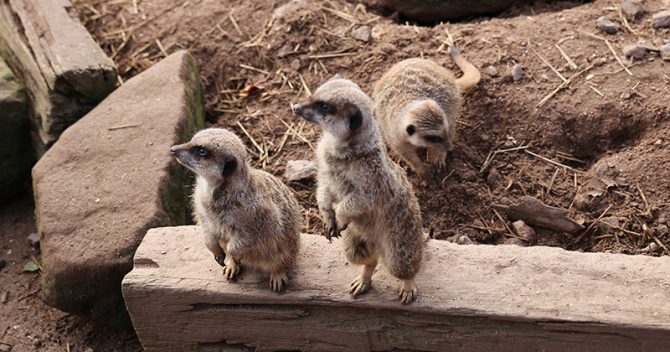
Land-based colleges are a deeply specialised part of the further education sector, with only about 15 scattered across the country. Without them, learners wouldn’t be leaving with level 1, 2 and 3 qualifications and extended diplomas to move on to workplaces that include conservation centres, wildlife parks, equine training centres and zoos, as well as on to various higher education qualifications, such as zoology and marine biology.
The practical element of the course is particularly important, given that handling a large bull, pregnant ewe or – rather you than me – a tarantula inexpertly comes with no minor consequences. Some of the solutions dreamt up by lecturers are model lessons in not only fulfilling the practical experience assessment component, but also how to keep flagging students onboard.
At Brooksby Melton College in Leicestershire, which has about 290 animals, learners needed to demonstrate they could pick up an invertebrate (an insect) around the right part of the thorax (body) for internal teacher assessments that go towards their final grade. While some assessments can be done on students’ own pet if they have them, not many people have a giant spiny stick insect from Papua New Guinea.
Lydia Bradwell, curriculum coordinator for animal management, explains that learners made life-like replicas from Blu Tac and cocktail sticks, and were then assessed on their correct handling via video link. Students have even, extraordinarily, been assessed on correct bandaging techniques using stuffed toys, as long as the proportions are similar to real life animals. “We need that evidence, and this is one way of getting around the problem,” she hoots.
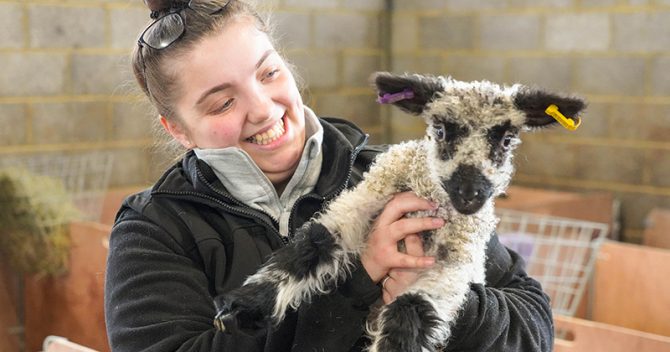
Doing things in miniature is also proving a popular learning route. Bradwell asked her students to set up a complete enclosure in a Tupperware box with all the correct elements, space, feed and proportions clearly labelled. A similar solution was proposed at Barnsley College near Leeds, where Charlotte Bantock, animal management course leader asked learners to design a zoo. “We looked at zoo maps and they had to answer questions such as, how has this zoo been designed and why? Why is that animal near that one, because they have similar requirements, are they are from the same continent, or for the visitor experience? Then they created their own zoos.”
But it’s not quite the same, and learners and staff are well aware of it. Back at Bishop Burton College, twins Charles and Will Smith, and friend Jack Fray, do lessons in livestock husbandry that features skills that are hard to pick up without hands-on learning. “If we were checking the sheep, for example, we would learn how to put them in the turnover crate, look at their teeth and feet and do a full check, make sure there’s no damage or disease,” says Fray. “It’s a skill in itself using the turnover crate, and you’re not learning that online, you’re looking at a picture of what could be wrong with your sheep. It’s a very different thing.”
You’re looking at a picture of what could be wrong with your sheep. It’s a very different thing.
Will chips in with a business-like stoicism. “The only good thing about Covid is the price of meat and countryside game has gone up.” So there are financial upsides to looking after livestock during Covid – but it’s a poor return for young people who like the outdoors.
Helen Wiffen, curriculum leader in animal management at Capel Manor College in London, is realistic about what the pandemic means for students. “I think it’s going to be really difficult for them to have the skills they normally would. We’re just trying to prioritise practicals as much as we can, whenever we can.”
Students under her care were tasked with creating individual projects such as setting wildlife camera traps. “They’ve seen a huge range of animals on there, foxes and all kinds of birds!” Video links inside veterinary surgeries have allowed students to ask questions, which can both contribute to work experience units as well as help students demonstrate competence in behaviour observation, a core component of animal care.
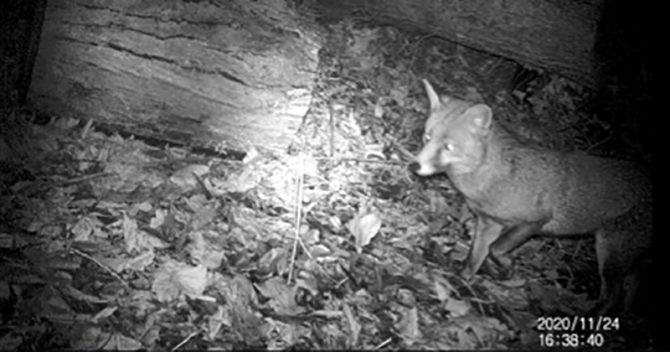
Keeping an eye on the animals is reaching Big Brother levels at Oaklands College in Hertfordshire, where a live video feed is currently being installed in the lambing barn. Colin Elcombe, the livestock manager, acknowledges that getting students the required skills has been “obviously very difficult” but that other technology, such as GoPros, should help students watch lecturers carry out tasks in real time. “With the lambs, students can log in any time, 24 hours a day, to check for signs of lambing,” he explains. “Then, if they see anything, they can engage with me and I’ll go rushing up there.”
It’s a bit like a high-intensity Spring Watch. Jay Jay Johnson, who is studying a level 3 technical diploma in animal management at Oaklands, puts a brave face on the situation. “What’s been difficult for me is we got really used to working with the animals and being independent with them. Now we’re not really doing practicals, and we can’t act independently with them.” He adds, a little sadly, “At the minute, we’re not seeing the animals at all.”
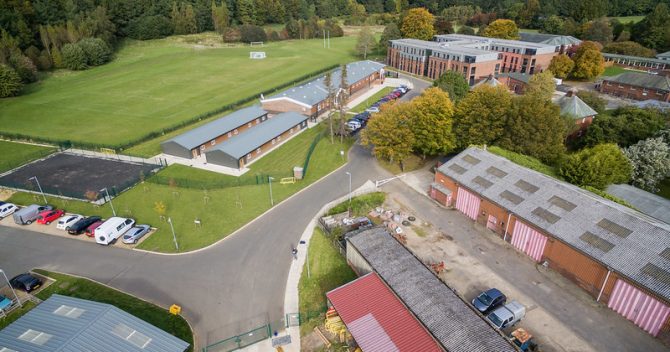
Purposeful work and animals have both been proven to be of great benefit to mental health ̶ so to have both removed at once must be quite tough for learners. The level of passion for animal care is infectious, however, and I find myself becoming quite excited as they send me pictures of tiny hedgehogs being weighed and foxes caught on camera at midnight. It seems there’s little risk of these students not returning to the courses again.
But staff have worked flat out and could do with some recognition from those on high. Walker reflects as we end our Zoom. “You know, on the news there’s even mention of vets and zookeepers, but we do get bypassed. For all of us, this has been one of the hardest years ever. I hope people find out what we do now.”

Your thoughts